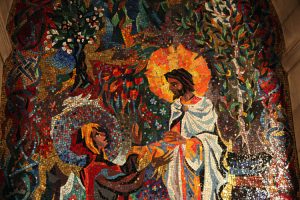HOMILY TUESDAY of EASTER WEEK
From Stuck in Grief to Good Grieving
(Acts 2:36-41; Ps 33; Jn 20:11-18)
************************************************
“Go to my brothers and say to them, “I am ascending to my Father and your Father, to my God and your God.”
“Go” and “Say” – two words that apply also to us.
These words of Jesus to Mary Magdalene continue the Good News of the resurrection of Jesus the church began to celebrate at the Easter vigils around the world.
It begins with Mary Magdalene in the garden, who is stuck in grief, like so many of us. She is looking for a dead Jesus, and when he appears to her, wants him back as he was before – she wants to cling to him.
 Jesus tells her the opposite. “Do not hold on to me,” he says. Rather, he pushes her into good grieving, into action. She is to go to the apostles and tell them the news of his ascension. So, she obeys, goes, and announces to them that she has seen the Lord, becoming in the process, the apostle to the apostles. And, for that brief in-between moment, she is the Church, representing all of us who believe in Jesus as Risen Lord.
Jesus tells her the opposite. “Do not hold on to me,” he says. Rather, he pushes her into good grieving, into action. She is to go to the apostles and tell them the news of his ascension. So, she obeys, goes, and announces to them that she has seen the Lord, becoming in the process, the apostle to the apostles. And, for that brief in-between moment, she is the Church, representing all of us who believe in Jesus as Risen Lord.
Often in our lives, Jesus is appearing and saying the same thing he said to Mary. We are not to cling to him; to our losses, and stay stuck in grief. Rather, we are to grieve and mourn those losses; give them back to God and receive the Spirit of our losses and our loved ones in new way.
That is exactly what is happening in the first reading. Peter stands with the others as a group of eleven apostles after the sending of the Holy Spirit upon them, transformed, full of courage and fearless, announcing the Good News that Jesus is both Lord of all creation, and the long-awaited Messiah. They have overcome their grief and are now dynamically going out and announcing the Good News of Jesus as Lord and Messiah to the whole world.
According to Bishop Robert Barron, the role of the messiah throughout Jewish history was four-fold: to gather all nations to himself; to restore the Temple; to deal with the enemies of Israel, and to reign over all of the universe.
All of this Jesus accomplished: he gathered all peoples to himself; he not only cleansed the Temple but made his own body into the new Temple of God’s presence; he dealt with not the political enemies of Israel, but the real enemies of all of humanity that is sin, addiction and death; and as Peter announced, Jesus is now Kyrios, Risen Lord, seated at the right hand of the Father and reigning over all of creation.
The way we can live this new life is through genuine repentance; receiving forgiveness of God for our sins; dying to them in baptism, and opening ourselves up to receiving the Holy Spirit and living in the Spirit.
Our new life means being empowered by the Spirit of the Risen Lord to forgive anyone who has hurt us in any way; to apologize and make amends to anyone we have hurt in any way; to grieve and mourn our losses, accept them, give them to God and receive the Spirit of those losses in a new way, and to live lives full of the peace and joy that Jesus alone can give.
The Eucharist is a participation already in that eternal Easter banquet that awaits us. By the power of the same Spirit that raised Jesus from the dead, humble gifts of bread and wine are transformed into the body and blood of the Risen Lord.
Forgiven, healed and transformed into the Body of Christ ourselves, we are now commissioned, sent out to go and announce the Good News of the Risen Lord, the Messiah, who forgives, heals and transforms our lives and can now transform the lives of others.



